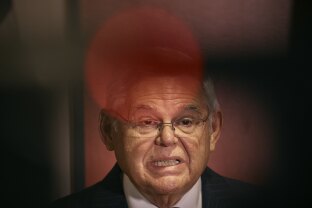When the House swiftly expelled George Santos — facing nearly two dozen federal charges and a scathing ethics report — 105 of his fellow Republicans joined almost every Democrat to vote in favor of kicking out the first-term representative.
On the other side of the Capitol, Democratic Sen. Bob Menendez is facing his own set of federal charges, including for bribery and acting as a foreign agent. But unlike the House, there’s no momentum to expel him, and his Senate colleagues are mostly steering clear of the mess.
In interviews with 19 senators last week, Democrats were reluctant to discuss the charges, said they hadn’t been following the case’s developments, and told NOTUS they didn’t listen to Menendez’s defiant Senate floor speech defending himself. (Menendez says he is innocent of any wrongdoing).
Instead, Democratic senators, including some who have urged Menendez to step down, are content to let the process play out in federal court and at the ballot box later this year. Their responses raise questions about the Senate’s willingness to police its own and whether the slow-moving body is equipped to urgently respond to crises of public trust when pessimism about government is running high.
The initial indictment against Menendez painted a cartoonish portrait of corruption, prompting most of his fellow Democrats to push for his resignation after he was charged in September. A new superseding indictment in the case came in early January and claims the three-term Democrat accepted gifts for helping a businessman who sought a deal with a Qatari investment group.
Santos was a newcomer to politics — he had little say in House business and even less say in the broader workings of government. His alleged crimes involved theft for personal gain: fraud, identity theft and falsifying records. Menendez, on the other hand, chaired the Foreign Relations Committee until recently, has played a pivotal role in major policy debates over China and Iran, and is accused of — among other things — sharing highly sensitive information with the Egyptian government.
Yet senators didn’t have much to say about any of it.
“No,” said Democratic Sen. Ben Cardin when asked for his reaction to the latest charges. Independent Sen. Bernie Sanders, who called on Menendez to resign last year, had a similar response: “Nope, I don’t,” he told NOTUS.
“Federal law enforcement is doing their work,” Sen. Michael Bennet, a Colorado Democrat, said. “I’m not sure there would be any role for the Senate to play, other than what we’ve already said.”
And Democratic Sen. Ben Ray Luján of New Mexico declined to comment on the case, repeatedly telling NOTUS, “It’s up to the voters of New Jersey to make a determination on who’s going to represent them in the U.S. Senate.”
Prosecutors have released implicating text messages, photographs of cash-filled envelopes investigators found stuffed into one of Menendez’s jackets, and pictures of him having meals with several other co-defendants. Perhaps most alarming to members of Congress: An allegation that Menendez shared non-public details with Egyptian officials about the number and nationalities of personnel at the American embassy in Cairo.
Menendez has pleaded not guilty, arguing on the Senate floor last week that the Justice Department is “engaged not in a prosecution, but a persecution.” As for the wads of cash and the gold bars, he says he will respond at his trial, where he expects to be vindicated.
Public pressure on him to resign hasn’t worked; Menendez reiterated his pledge not to step aside last week. Most senators dismiss the prospect of expulsion to force him out any time soon, deferring to the upper chamber’s ethics panel to investigate first. But those investigations are opaque (the Select Committee on Ethics won’t even confirm when one is taking place) and typically take years to resolve, almost always without much consequence.
It’s not clear if the panel has launched an investigation into Menendez, and it usually defers to the Justice Department during criminal investigations: “Absent special circumstances, it has been the long-standing policy of the Committee to yield investigation into matters where there is an active and ongoing criminal investigation or proceeding so as not to interfere in that process,” the committee said after Menendez was charged.
Menendez’s trial is set for May. If he chooses to run for his seat again, his primary election will come shortly afterward, or possibly while the legal proceedings are still underway.
In the meantime, Menendez is operating with all the rights and privileges of a U.S. senator. He had to step down as chair of the Foreign Relations committee after he was charged, but he still sits on the panel as a member and has attended at least one classified briefing since his indictment. He also attends weekly party lunches.
“It’s like everything’s normal for him,” said Sen. Peter Welch, a Vermont Democrat who has urged Menendez to resign.
But he told NOTUS expulsion isn’t on senators’ minds.
“We’ve got our hands full with the supplemental, with Ukraine, with Israel, with the border,” Welch said in an interview last week. “Do we have time to do a hearing?”
Sen. Mazie Hirono, a Hawaii Democrat who has also called on Menendez to step down, agreed an expulsion isn’t likely. “No, no,” she said. “There’s a process that he’s going to have to go through. There’s a trial.”
But Santos’ removal in the House created a recent precedent for disciplining a lawmaker prior to a criminal conviction. His case hadn’t gone to trial yet, but members of the House Ethics committee and many of Santos’ Republican colleagues were alarmed by the investigation’s findings and pushed for quick action.
Sen. Richard Blumenthal, a Connecticut Democrat who thinks Menendez should resign, bristled at the comparison. “They’re two entirely different cases. On the facts, in all kinds of ways, they are just totally distinct,” he told NOTUS. “It’s a little bit like asking, ‘Why isn’t everyone charged found guilty?’ You know, different facts, different levels of culpability for different offenses.”
“He’s been charged with extraordinarily serious felonies, and he’s presumed to be innocent until he is found guilty,” Blumenthal added of Menendez.
Senate Democrats may be remembering Menendez’s prior corruption case, as they wait to see how this one unfolds. He’s weathered federal bribery charges before: A separate case against him in New Jersey ended in 2017 with a mistrial, as jurors were unable to agree on a verdict.
The Senate has only rarely expelled its own members, a move that requires support from two-thirds of the chamber. The last senators to receive that punishment were ousted for supporting the Confederacy during the Civil War. Others who got close to being expelled in more recent decades resigned before they could be removed.
At least one Democrat, however, is itching to bring expulsion back: “How much more before we finally expel @SenatorMenendez?” Sen. John Fetterman, a Pennsylvania Democrat, posted on X after prosecutors released their latest, superseding indictment.
But even some Republicans, like Sen. Kevin Cramer, have called on Menendez to stay in office, praising his hawkish stances on foreign policy debates. And Senate Minority Leader Mitch McConnell has described it as “an issue for the Democrats to deal with.”
Menendez has accused the Justice Department of attempting to poison his jury pool by issuing two superseding indictments to keep his case in the news and “convict me in the court of public opinion.”
“The government’s tactics harm not just me, but each of you, my colleagues, the political establishment, and most importantly, the electorate of New Jersey,” he told his Senate colleagues from the floor.
Sen. Mitt Romney, a Utah Republican who sits on the Foreign Relations Committee with Menendez, told NOTUS he didn’t listen to the speech, but he disagreed with its premise.
“I don’t buy that line of reasoning,” he said. “You’re seeing a number of people, whether it’s the president of Harvard, President Trump, Senator Menendez, who want to expand their woes to a class of people. The reality is, they’re accused of doing some seriously bad stuff. And if they did it, then there’s consequence.”
In a statement to NOTUS on Wednesday, Menendez described his colleagues’ responses to his speech as “overwhelmingly positive.”
“Senator Romney should understand that the false foreign agent charge is one the government could then leverage against actions members routinely take as a function of their role, especially in the area of foreign policy,” he said. “This would be a grave overreach into the role of this body.”
The Senate ethics committee doesn’t have a strong track record of doling out punishments in recent years. All of its responses to cases going back 15 years have been symbolic, coming in the form of public or private letters of admonition. Its work can also move slowly. When nearly 20 women accused former Republican Sen. Bob Packwood of sexual harassment and misconduct in the early 1990’s, it took the panel nearly three years to recommend his expulsion. (Packwood resigned before the chamber held a vote.)
Government accountability advocates today still question whether senators are too easy on their colleagues, and why the ethics panel doesn’t divulge more details about its investigations.
Proponents of the ethics committee’s current approach (mostly elected senators) argue it is appropriately cautious about allegations.
“The Ethics Committee does a good job,” Sen. Thom Tillis, a North Carolina Republican, told NOTUS. “The way the Ethics Committee is structured is one where politics very seldom influences what they carry out.”
Tillis said he wouldn’t support creating an independent oversight body made up of non-members, like the separate Office of Congressional Ethics that probes allegations of misconduct in the House.
“There’s no such thing as independent,” he said. “I don’t want to create another body that will by itself be politicized.”
And Sen. Sheldon Whitehouse, a Rhode Island Democrat who has made the case for enforceable ethics rules for the Supreme Court, told NOTUS he isn’t concerned with the Senate’s lack of transparency in its own investigations.
“The fact that we handle them opaquely doesn’t seem anywhere near as unfortunate as the Supreme Court refusing to handle them at all,” he said. (The court did adopt a code of ethics publicly for the first time last year, but Democratic lawmakers criticized it at the time for not containing clear accountability mechanisms for infractions).
Massachusetts Sen. Elizabeth Warren, a Democrat, holds a different view. She has pushed for expanded ethics rules across the federal government, including placing the Senate under a nonpartisan, independent oversight panel.
“It would put us in a better position if we had stronger rules and more vigorous enforcement,” Warren told NOTUS.
Still, she declined to dive into the details of Menendez’s case, responding simply, “Senator Menendez should not be in the United States Senate.”
—
Haley Byrd Wilt is a reporter at NOTUS.
Sign in
Log into your free account with your email. Don’t have one?
Check your email for a one-time code.
We sent a 4-digit code to . Enter the pin to confirm your account.
New code will be available in 1:00
Let’s try this again.
We encountered an error with the passcode sent to . Please reenter your email.



